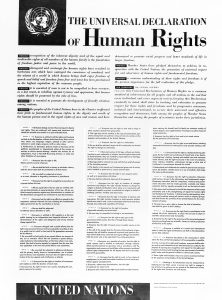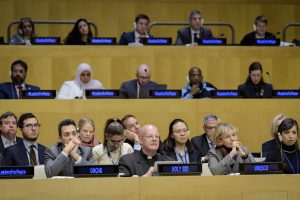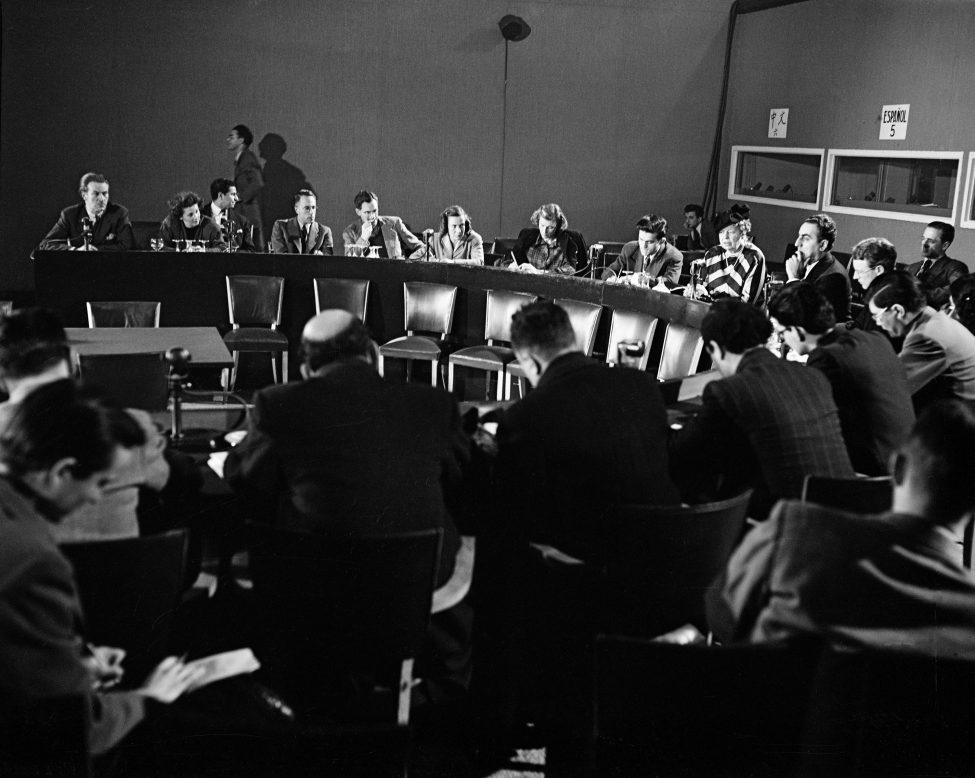By: Kristen Whitney Daniels
On 10 December, the United Nations celebrated the 70th anniversary of the proclamation of the Universal Declaration of Human Rights (UDHR). This monumental document, which has been translated into over 500 languages, was the first document of its kind to lay out fundamental human rights that should be guaranteed and protected across the globe. Containing a preamble and 30 articles, the document touches on everything from slavery to discrimination, from torture to migration, from social security to education, and much more in-between.

English version of a poster depicting the Universal Declaration of Human Rights. (United Nations)
The document was a direct reaction to the atrocities committed during the Second World War. Following the end of the war, the United Nations and the UN Charter was created. World leaders decided that another document was needed “with a road map to guarantee the rights of every individual everywhere,” according to the UN website. During the UN’s very first General Assembly session in 1946, leaders reviewed the “Declaration on Fundamental Human Rights and Freedoms,” the document that would later become the UDHR.
In 1947, the UN Economic and Social Council (ECOSOC) established a formal committee tasked with creating a draft and presenting a document that represented an “International Bill of Human Rights.” The 18-person committee contained representatives from eight States, accounting for different geographical representation. The ten members of the committee were representative of many countries and cultures: Australia, Canada, Chile, China, France, India, Lebanon, the Soviet Union, the United Kingdom, and the USA. The two women who were members played important roles in the drafting of this document. Eleanor Roosevelt (USA) was the chairperson of the UDHR drafting committee and the “driving force” for its adoption, while Hansa Mehta (India) is widely credited with changing the phrase “All men are born free and equal” to “All human beings are born free and equal” in Article 1 of the UDHR.
“Where after all do universal human rights begin? In small places, close to home – so close and so small that they cannot be seen on any map of the world. Yet they are the world of the individual person: The neighborhood he lives in; the school or college he attends; the factory, farm or office where he works. Such are the places where every man, woman, and child seeks equal justice, equal opportunity, equal dignity without discrimination. Unless these rights have meaning there, they have little meaning anywhere. Without concerted citizen action to uphold them close to home, we shall look in vain for progress in the larger world.” —Eleanor Roosevelt, March 1958

Participants of the launch of the “Leaders for Peace Campaign”, held for Human Rights Day (10 December) and on the occasion of the 70th anniversary of the Universal Declaration of Human Rights. (United Nations)
On 10 December 1948, at a General Assembly meeting in Paris, the UDHR was formally adopted with 48 of the 58 member States voting in favor, 10 States abstaining, and none voting against it. In 1968, Eleanor Roosevelt was posthumously awarded the United Nations Human Rights Prize for her work on the UDHR.
The document was truly remarkable in its ability to create a universally relevant guide for all countries and people of the world. As the UN writes about the history of the document on their website, “The entire text of the UDHR was composed in less than two years. At a time when the world was divided into Eastern and Western blocks, finding a common ground on what should make the essence of the document proved to be a colossal task.”
The document is as relevant today as it was 70 years ago. It continues to be the guiding principle for the work of the United Nations and International Human Rights Law.
[Kristen Whitney Daniels is the assistant director of the U.S. Federation of the Sisters of St. Joseph]

